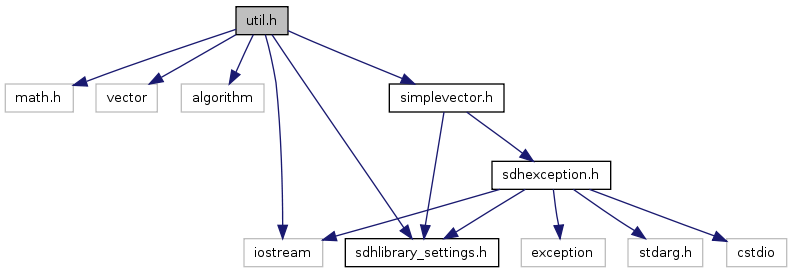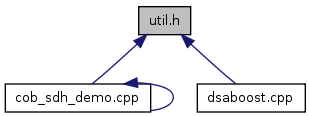Interface of auxilliary utility functions for SDHLibrary-CPP. More...
#include <math.h>#include <vector>#include <algorithm>#include <iostream>#include "sdhlibrary_settings.h"#include "simplevector.h"

Go to the source code of this file.
Auxiliary functions | |
|
| |
| #define | DEFINE_TO_CASECOMMAND(_c) case _c: return (#_c) |
| #define | DEFINE_TO_CASECOMMAND_MSG(_c,...) case _c: return (#_c ": " __VA_ARGS__) |
| template<typename Function , typename InputIterator > | |
| Function | apply (Function f, InputIterator first, InputIterator last) |
| template<typename Function , typename Tp > | |
| void | apply (Function f, Tp &sequence) |
| bool | Approx (int n, double *a, double *b, double *eps) |
| double | Approx (double a, double b, double eps) |
| int | CompareReleases (char const *rev1, char const *rev2) |
| compare release strings | |
| double | DegToRad (double d) |
| bool | InIndex (int v, int max) |
| bool | InRange (int n, double const *v, double const *min, double const *max) |
| bool | InRange (double v, double min, double max) |
| template<typename Function , typename Tp > | |
| Tp | map (Function f, Tp sequence) |
| template<typename T > | |
| std::ostream & | operator<< (std::ostream &stream, std::vector< T > const &v) |
| double | RadToDeg (double r) |
| void | SleepSec (double t) |
| void | ToRange (cSimpleVector &v, std::vector< double > const &min, std::vector< double > const &max) |
| void | ToRange (std::vector< double > &v, std::vector< double > const &min, std::vector< double > const &max) |
| void | ToRange (int n, double *v, double const *min, double const *max) |
| double | ToRange (double v, double min, double max) |
Interface of auxilliary utility functions for SDHLibrary-CPP.
Definition in file util.h.
| #define DEFINE_TO_CASECOMMAND | ( | _c | ) | case _c: return (#_c) |
Just a macro for the very lazy programmer to convert an enum or a DEFINE macro into a case command that returns the name of the macro as string.
Usage:
char const* eSomeEnumType_ToString( eSomeEnumType rc ) { switch (rc) { DEFINE_TO_CASECOMMAND( AN_ENUM ); DEFINE_TO_CASECOMMAND( AN_OTHER_ENUM ); ... default: return "unknown return code"; } }
See also DEFINE_TO_CASECOMMAND_MSG
| #define DEFINE_TO_CASECOMMAND_MSG | ( | _c, | |||
| ... | ) | case _c: return (#_c ": " __VA_ARGS__) |
Just a macro for the very lazy programmer to convert an enum or a DEFINE macro and a message into a case command that returns the name of the macro and the message as string.
Usage:
char const* eSomeEnumType_ToString( eSomeEnumType rc ) { switch (rc) { DEFINE_TO_CASECOMMAND_MSG( AN_ENUM, "some mighty descriptive message" ); DEFINE_TO_CASECOMMAND_MSG( AN_OTHER_ENUM, "guess what" ); ... default: return "unknown return code"; } }
See also DEFINE_TO_CASECOMMAND
| Function apply | ( | Function | f, | |
| InputIterator | first, | |||
| InputIterator | last | |||
| ) | [inline] |
Apply a function to every element of a sequence.
| first | An input iterator. | |
| last | An input iterator. | |
| f | A unary function object. |
f.Applies the function object f to each element in the range [first,last). f must not modify the order of the sequence. If f has a return value it is ignored.
| void apply | ( | Function | f, | |
| Tp & | sequence | |||
| ) | [inline] |
| bool Approx | ( | int | n, | |
| double * | a, | |||
| double * | b, | |||
| double * | eps | |||
| ) |
Return True if list/tuple/array a=(a1,a2,...) is approximately the same as b=(b1,b2,...). I.E. |a_i-b_i| < eps[i]
| double Approx | ( | double | a, | |
| double | b, | |||
| double | eps | |||
| ) |
Return True if a is approximately the same as b. I.E. |a-b| < eps
| int CompareReleases | ( | char const * | rev1, | |
| char const * | rev2 | |||
| ) |
compare release strings
| double DegToRad | ( | double | d | ) |
Return d in deg converted to rad
| bool InIndex | ( | int | v, | |
| int | max | |||
| ) |
Return True if v is in range [0 .. max[
| bool InRange | ( | int | n, | |
| double const * | v, | |||
| double const * | min, | |||
| double const * | max | |||
| ) |
Return True if in list/tuple/array v=(v1,v2,...) each v_i is in range [min_i..max_i] with min = (min1, min2,...) max = (max1, max2, ..)
| bool InRange | ( | double | v, | |
| double | min, | |||
| double | max | |||
| ) |
Return True if v is in range [min .. max]
| Tp map | ( | Function | f, | |
| Tp | sequence | |||
| ) | [inline] |
| std::ostream& operator<< | ( | std::ostream & | stream, | |
| std::vector< T > const & | v | |||
| ) | [inline] |
Overloaded insertion operator for vectors: a comma and space separated list of the vector elements of v is inserted into stream
| stream | - the output stream to insert into | |
| v | - the vector of objects to insert into stream |
using namespace SDH directive then things are easy and intuitive: #include <sdh/util.h> using namespace SDH; std::vector<int> v; std::cout << "this is a std::vector: " << v << "\n";
using namespace SDH accessing the operator is tricky, you have to use the 'functional' access operator<<(s,v) in order to be able to apply the scope resolution operator #include <sdh/util.h> std::vector<int> v; SDH::operator<<( std::cout << "this is a std::vector: ", v ) << "\n";
std::cout << faa ; // obviously fails with "no match for >>operator<<<< in >>std::cout << faa<<", as expected std::cout SDH::<< faa ; // is a syntax error std::cout SDH::operator<< faa ; // is a syntax error std::cout operator SDH::<< faa ; // is a syntax error
| double RadToDeg | ( | double | r | ) |
Return r in rad converted to deg
| void SleepSec | ( | double | t | ) |
Sleep for t seconds. (t is a double!)
| void ToRange | ( | cSimpleVector & | v, | |
| std::vector< double > const & | min, | |||
| std::vector< double > const & | max | |||
| ) |
Limit each v_i in v to range [min_i..max_i] with min = (min1, min2,...) max = (max1, max2, ..) This modifies v!
| void ToRange | ( | std::vector< double > & | v, | |
| std::vector< double > const & | min, | |||
| std::vector< double > const & | max | |||
| ) |
Limit each v_i in v to range [min_i..max_i] with min = (min1, min2,...) max = (max1, max2, ..) This modifies v!
| void ToRange | ( | int | n, | |
| double * | v, | |||
| double const * | min, | |||
| double const * | max | |||
| ) |
Limit each v_i in v to range [min_i..max_i] with min = (min1, min2,...) max = (max1, max2, ..) This modifies *v!
| double ToRange | ( | double | v, | |
| double | min, | |||
| double | max | |||
| ) |
Return v limited to range [min .. max]. I.e. if v is < min then min is returned, or if v > max then max is returned, else v is returned